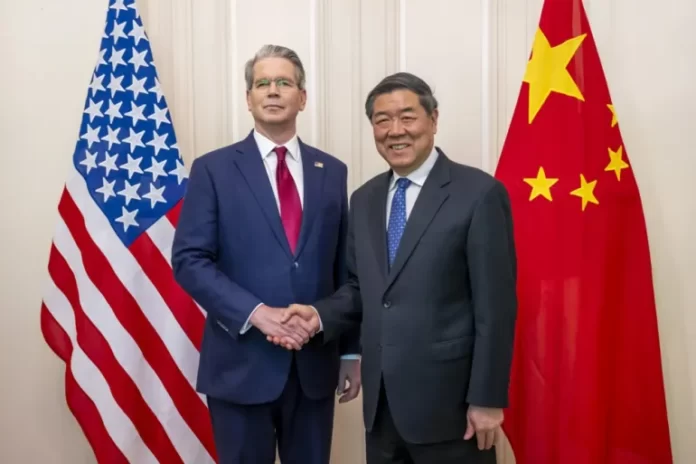U.S. and Chinese officials held trade talks in London at Lancaster House, extending into a second day.
The discussions, involving the world’s two largest economies, aimed to ease tensions over tariffs and rare earth restrictions. The talks followed a temporary truce from Geneva that had calmed markets.
U.S. President Donald Trump described the talks as going well, saying he received positive reports from his team. He offered no details but mentioned possible changes to export controls.
White House economic adviser Kevin Hassett said the U.S. sought a commitment from China on rare earth shipments, expecting eased export controls and increased shipments soon after. Trump and Chinese President Xi Jinping spoke by phone, their first direct contact since Trump’s January 20 inauguration.
Trump said the call focused on trade and led to a positive outcome, noting Xi agreed to resume rare earth shipments to the U.S. China granted temporary export licenses to rare earth suppliers for the top three U.S. automakers.
The U.S. team included Treasury Secretary Scott Bessent, Commerce Secretary Howard Lutnick, and U.S. Trade Representative Jamieson Greer. China’s delegation, led by Vice Premier He Lifeng, included Commerce Minister Wang Wentao and trade negotiator Li Chenggang.
Lutnick’s presence highlighted the focus on rare earths, as his agency oversees U.S. export controls. China controls much of the global supply of rare earth magnets, key for electric vehicle motors. Lutnick did not attend the Geneva talks, where a 90-day deal reduced some tariffs.
China’s exports to the U.S. dropped 34.5% year-on-year in May, the largest decline since February 2020, when the COVID-19 pandemic disrupted trade. U.S. business and household confidence weakened, and first-quarter GDP contracted due to a surge in imports as consumers bought goods before expected price hikes.
Inflation remained stable, and the job market held steady, though economists predict challenges ahead.
In a separate development, a U.S. appeals court reviewed the Trump administration’s appeal of a trade court ruling that found Trump’s tariffs on Chinese and other goods exceeded his legal authority. The court could rule soon on whether the tariffs remain during the appeal, which may reach the Supreme Court.
China’s April suspension of critical mineral and magnet exports disrupted supply chains for automakers, aerospace, semiconductor, and military sectors. A former Trump trade adviser, Kelly Ann Shaw, now at Akin Gump, said China might recommit to lifting export restrictions, while the U.S. could ease some recent export controls, though not those on advanced AI chips.
In May, the U.S. halted shipments of semiconductor design software, chemicals, and aviation equipment, revoking prior export licenses.
The Geneva deal led to a global stock market rally, with U.S. indexes recovering most losses. However, Ian Bremmer of Eurasia Group noted that a lasting U.S.-China trade deal remains unlikely due to ongoing decoupling and U.S. efforts to reduce China’s role in global supply chains.
Trump’s team remains cautious, prioritizing other trade deals.




